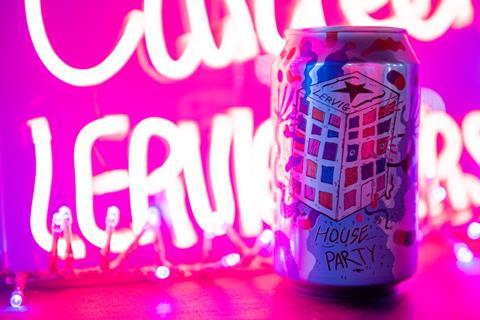
Nordic brewer Lervig has leveraged artificial intelligence to overturn a ruling that would have all but barred one of its beers from sale in the UK.
A complaint, made as part of a proactive audit of the alcohol market commissioned by the Portman Group, raised concerns that Lervig’s House Party IPA could appeal to underage drinkers.
After a provisional verdict by the Portman Group’s independent complaints panel to uphold the complaint, Lervig said it had turned to AI to help it overrule the decision.
“AI is changing the game for small companies like us,” said Lervig CEO Anders Kleinstrup. “Before most would probably just comply due to the potential cost and time, but today the ‘AI lawyer’ is free and makes it easier without having to handle the huge workload that craft producers have zero staff for.”
Lervig asked AI to scrape data from previous cases on the Portman Group website, as well as the letter it had been sent by the watchdog, Kleinstrup said. The supplier then set the technology the task to get the decision overturned.
“House Party has been in the market for years and years and has never had any complaints on the brand name or visuals,” he said. “It’s a 4% session, hop-bitter pale ale with a premium price tag, not much that [would] appeal to under-18s.”
Lervig’s appeal had been successful on the grounds that while the name House Party “would have a certain amount of appeal to a teenage age group” it would also “strongly resonate with a younger adult demographic”, the Portman Group said.
“This, alongside an abstract, stylised design with a limited colour palette with a simplistic font, meant the panel concluded that the packaging did not have a particular appeal to under-18s,” it added.
“It is very unusual that the panel overturns a provisional decision. However, this case shows the benefits of producers engaging with the complaints process and with the panel,” said Rachel Childs, chair of the Portman Group’s independent complaints panel. “This also shows the importance of our two-step process in ensuring we have considered and fully discussed all factors before making a full and final decision.”
Kleinstrup said Lervig had elected to go public about its dispute with the Portman Group so that UK consumers could “know more about what’s being taken away from them”.
“We need less regulators making opinions and choices on behalf of people to ‘protect’ them from not thinking themselves,” he said. “Worst case we’ll end up with supermarkets looking all grey with big disclaimers on the front of everything.
“This is not where anyone wants us to end up, I’m sure, but step by step it could happen.”



















No comments yet